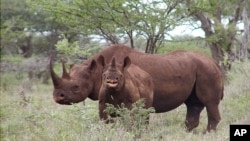The slaughter of rhinos in South Africa grows worse with each passing year, despite what the government describes as intense efforts to stop poaching.
That fact became clear this week when the government confirmed that a record number of rhinos were illegally killed in 2014.
“During 2014, we are sad to say this, the number of 1,215 rhinos were killed,” Environmental Affairs Minister Edna Molewa told journalists in Pretoria on Friday. “This is a rise in the number of poached rhino from 1,004 in 2013. This is indeed very worrying.”
That’s a 21 percent increase from 2013, which until now was the worst year on record. Molewa said another 49 rhinos have been killed in the first few weeks of 2015.
The World Wildlife Fund estimates that South Africa is home to about 20,000 rhinos -- more than 80% of the world’s rhino population.
Based on that population estimate, about 6 percent of South Africa’s rhinos were killed in 2014.
The animals are hunted for their horn, which is prized in Asia as traditional medicine, although there is no scientific evidence it has any effect. Rhino horns are composed entirely of keratin, the same substance as human nails and hair.
Nevertheless, the horn fetches incredible prices on the black market. Some experts have said it can go for as much as $100,000 a kilogram.
Molewa also noted a rise in the number of arrests of suspected poachers, to 386. But conservationists say that once suspects are arrested, they often fall through the cracks of South Africa’s notoriously inefficient legal system. Some active conservationists have appealed to parliament to change the laws to institute stiffer penalties for rhino poachers -- with no success so far.
Molewa said it’s clear that more needs to be done, and noted that South Africa is going to extreme lengths to protect rhinos. One measure, she said, is the relocation of animals to secret locations in neighboring countries. She said that about 100 rhinos had been moved to other nations in 2014, and predicted another 200 relocations in 2015.
But the World Wildlife Fund said, in a statement, that the poaching problem is a multifaceted one, and involves international crime syndicates. And so, WWF officials said, the problem needs an international solution.
“Killing on this scale shows how rhino poaching is being increasingly driven by organized criminal syndicates,” said Elisabeth McLellan, who heads the group’s Wildlife Crime Initiative. ”The country’s brave rangers are doing all they can on the ground to protect rhinos but only a concerted global effort can stop this illegal trade. This includes South Africa scaling up its efforts to stop wildlife trafficking and Vietnam taking urgent measures to stop illegal use of wildlife products including rhino horn.”
WWF described 2015 as a “make-or-break” year for South Africa’s rhinos. Conservationists and governments will next have a chance to discuss this issue in March, at the Inter-governmental Conference on Illegal Wildlife Trade, in Botswana.
